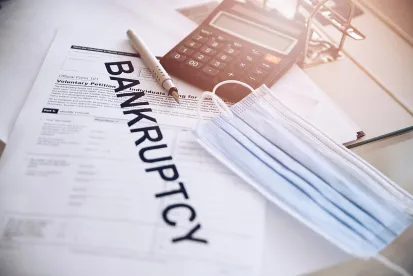The filing of a bankruptcy petition under any chapter of the Bankruptcy Code creates the ‘automatic stay,’ which prevents creditors from taking any further action against either the debtor or the debtor’s assets during the bankruptcy. Seasoned bankruptcy attorneys know that a violation of the automatic stay is a serious matter and, because of this, appropriately advise their clients on complying with, or enforcing, the stay. However, stay violations can inadvertently occur even when all reasonable and necessary precautions are taken. Large, sophisticated businesses — with multiple addresses, departments and employees — may still inadvertently contact or bill the debtor after the bankruptcy is filed. For debtors’ attorneys, on this surface this may seem like a golden opportunity to sue the violating creditor for a stay violation with the goal (or hope) of producing a favorable monetary settlement. But, should the debtor’s attorney first attempt to remedy the issue through non-litigation means? What duties does the attorney have under Federal Rule of Bankruptcy Procedure 9011 (“Rule 9011”) before filing litigation?[1] Does any stay violation give a debtor’s attorney free reign to a seek a big pay day?
A recent 28-page Order from the Bankruptcy Court for the District of South Carolina in the case of In re James Defeo v. Winyah Surgical Specialists, P.A., Adv. Pro. No. 21-80011-JW (Sept. 27, 2021) — wherein the Court sanctioned the debtor’s attorney $10,000 for violations of Rule 9011 — provides guidance on these questions.
In Defeo, the Debtor filed bankruptcy on Oct. 2, 2020. The creditor-Defendant mailed the Debtor a $910.00 invoice on Nov. 17, 2020. Debtor’s counsel then called the Defendant and told the Defendant of the bankruptcy. On Feb. 2, 2021, Defendant mailed a second invoice to the Debtor for the same debt. The Defendant admitted it had notice of the bankruptcy when it sent the second invoice but contended that the invoice was automatically sent by its computer system in error. After realizing and correcting the error, Defendant made no further collection attempts against the Debtor. And Debtor’s counsel made no further efforts to contact the creditor after receiving the second bill and ultimately sued the creditor on Feb. 15, 2021. The Complaint demanded $50,000 in punitive damages and alleged, among other things, that the Defendant willfully and intentionally violated the stay and engaged in “overly aggressive, devious, deceptive, manipulative, oppressive, abusive and illegal collection.” On April 8, 2021, the Defendant served (but did not file) a motion for sanctions (“Motion for Sanctions”) against the Debtor’s counsel on the grounds that Debtor’s counsel violated Rule 9011 by (i) failing to conduct an investigation or inquiry into the Complaint’s allegations that was reasonable under the circumstances and (ii) filing the Complaint for the improper purpose of procuring a settlement payment. Debtor’s counsel refused to withdraw or amend the Complaint in response to the Motion for Sanctions, and after the running of the 21-day safe harbor period, on May 3, 2021, the Defendant filed the Motion for Sanctions with the Court.
The Court analyzed the Debtor’s attorney’s conduct and determined that he had violated Rule 9011. First, the attorney did not conduct a reasonable investigation into the factual and legal grounds for the Complaint as required by Rule 9011(b)(2). Specifically, the Court noted that the Complaint contained several allegations regarding the specific mindset and intent of Defendant, including that Defendant “chose to flagrantly, wantonly and with gross disdain and disregard violate the bedrock of the bankruptcy process.” However, Debtor’s counsel did not actually conduct an investigation or inquiry into the Defendant’s intent, as the sole basis for the Complaint was the second $910 invoice sent to the Debtor. No witnesses were interviewed and the record showed that Debtor’s counsel uncovered no other communications from the Defendant to the Debtor, such as threatening letters, emails, calls, text messages, personal visits or lawsuits. The Court also noted that the invoices sent to the Debtor were (i) mildly worded and contained no indication that Defendant intended to “annoy, threaten, cause harm, abuse, intimidate or harass the Debtor” and (ii) did not, by itself, reasonably lead to an inference that Defendant engaged in “overly aggressive, devious, deceptive, manipulative, oppressive, abusive, and illegal collection.”
Second, the Court found that the Complaint also violated Rule 9011(b)(1) because it was filed for an improper purpose of obtaining a substantial damages award or settlement. The Court reasoned that the prominent placement of the demand for $50,000 on the front page of the Complaint and extreme characterization of Defendant’s conduct — which did not match the severity of the stay violation — was evidence that the Complaint was filed to intimidate and threaten the Defendant into a settlement.
Finally, the Court determined that the Debtor’s attorney should be sanctioned $10,000 under Rule 9011(c). The Court reasoned that the $10,000 sanction was appropriate because the Complaint included several allegations without a factual basis and demanded a damages amount that was not proportionate to the stay violation. This placed the Defendant at a high risk and heavily contributed to its spending substantial attorneys’ fees in defending the Complaint and pursuing the Motion for Sanctions. The Court also noted that a monetary sanction was necessary to deter future misconduct by the Debtor’s attorney, who had shown a pattern of brining similar lawsuits. The attorney had filed over 100 adversary proceedings for alleged willful violations of the automatic stay over the years, many of which were based upon the mailing of simple collection letters or invoices.
The Defeo case, while a bit of an extreme example, is a cautionary tale for debtors’ attorneys. While the creditor in Defeo technically violated the automatic stay, it took reasonable and prompt steps to correct the issue and did not contact the Debtor after fixing the issue. On the other hand, Debtor’s counsel’s response, demands and allegations in the filed Complaint had no factual support and were out of proportion to the stay violation. The Court’s Order in Defeo not only provides a good roadmap (and refresher) for how debtor’s attorneys can comply with Rule 9011 when investigating and responding to stay violations, but it also serves as a grim reminder that stay violations do not provide counsel with free pass to seek a substantial settlement.
FOOTNOTE
[1] All attorneys appearing and filing documents in the bankruptcy court have duties under Fed. R. Bankr. P. 9011 when making representations to the Court. Rule 9011 is the bankruptcy equivalent of Rule 11 of the Federal Rules of Civil Procedure.




 />i
/>i

